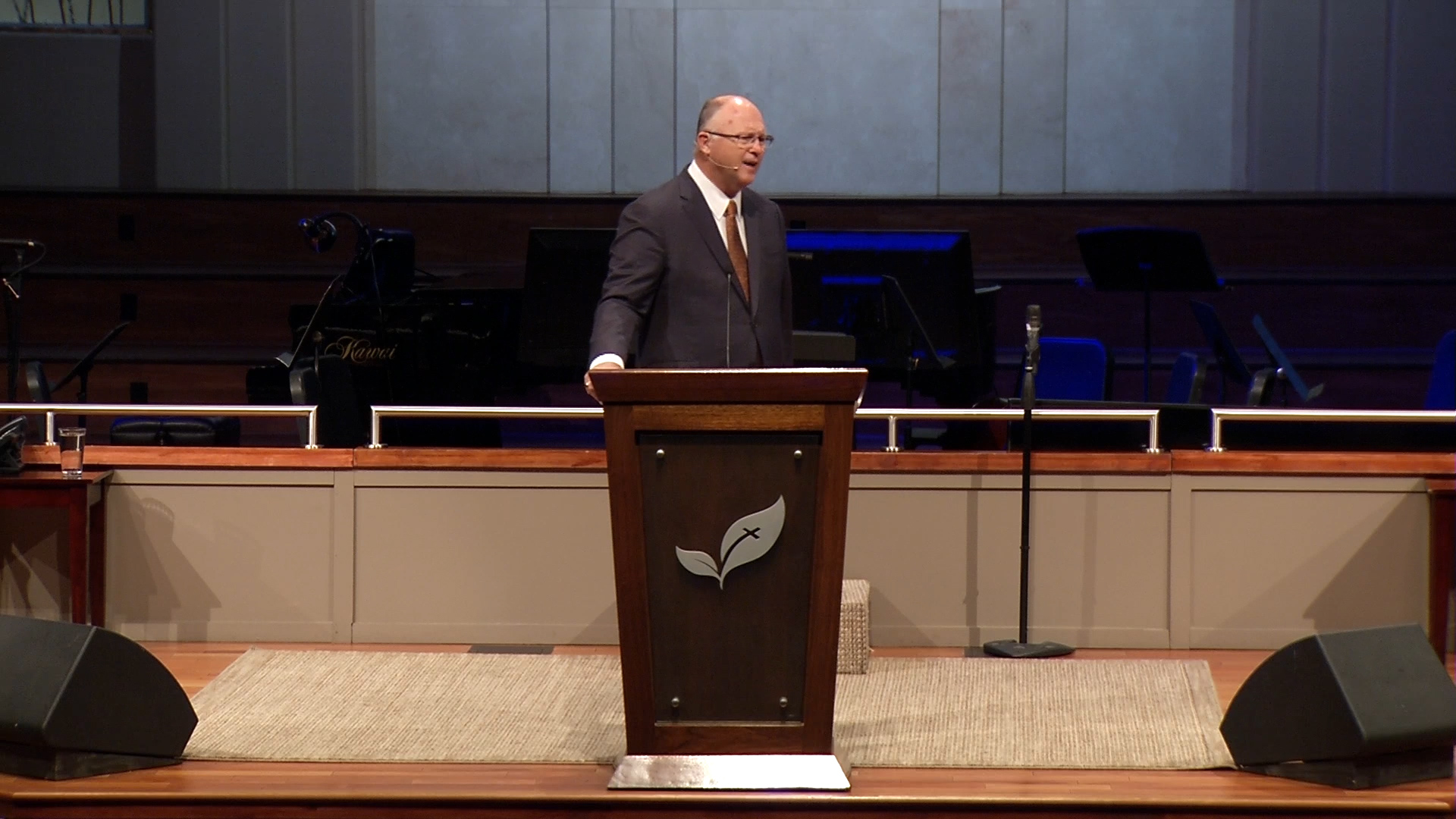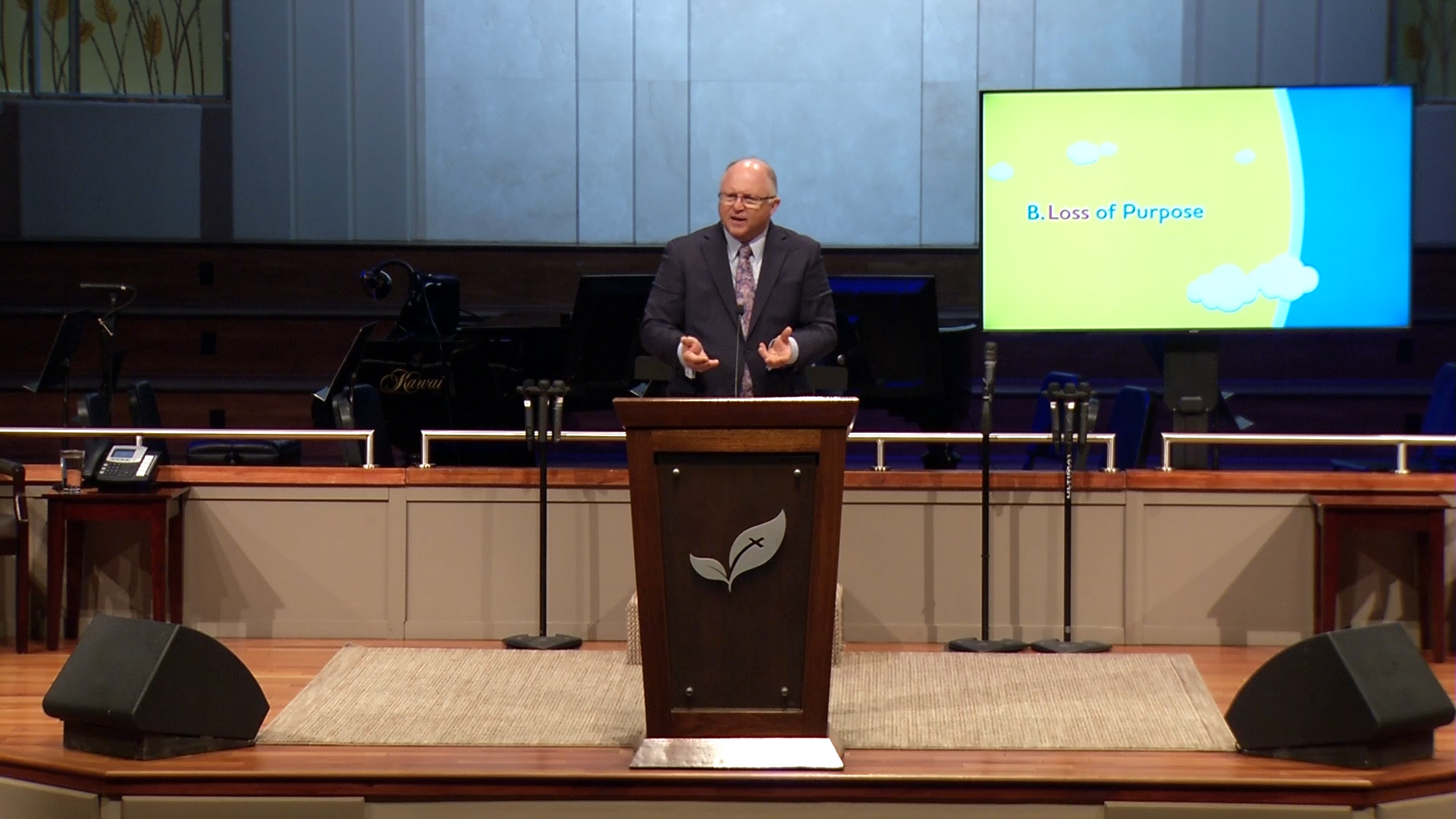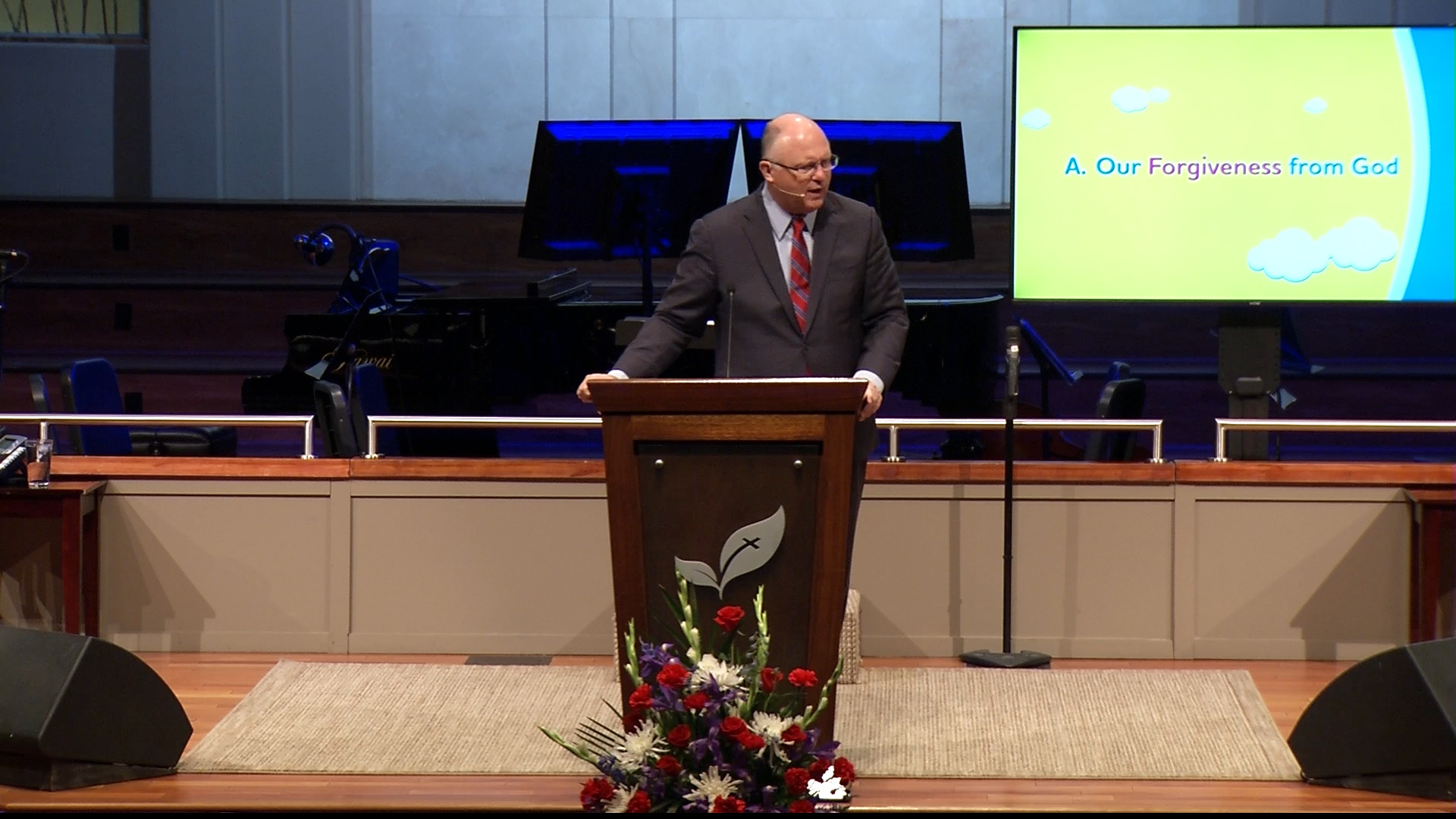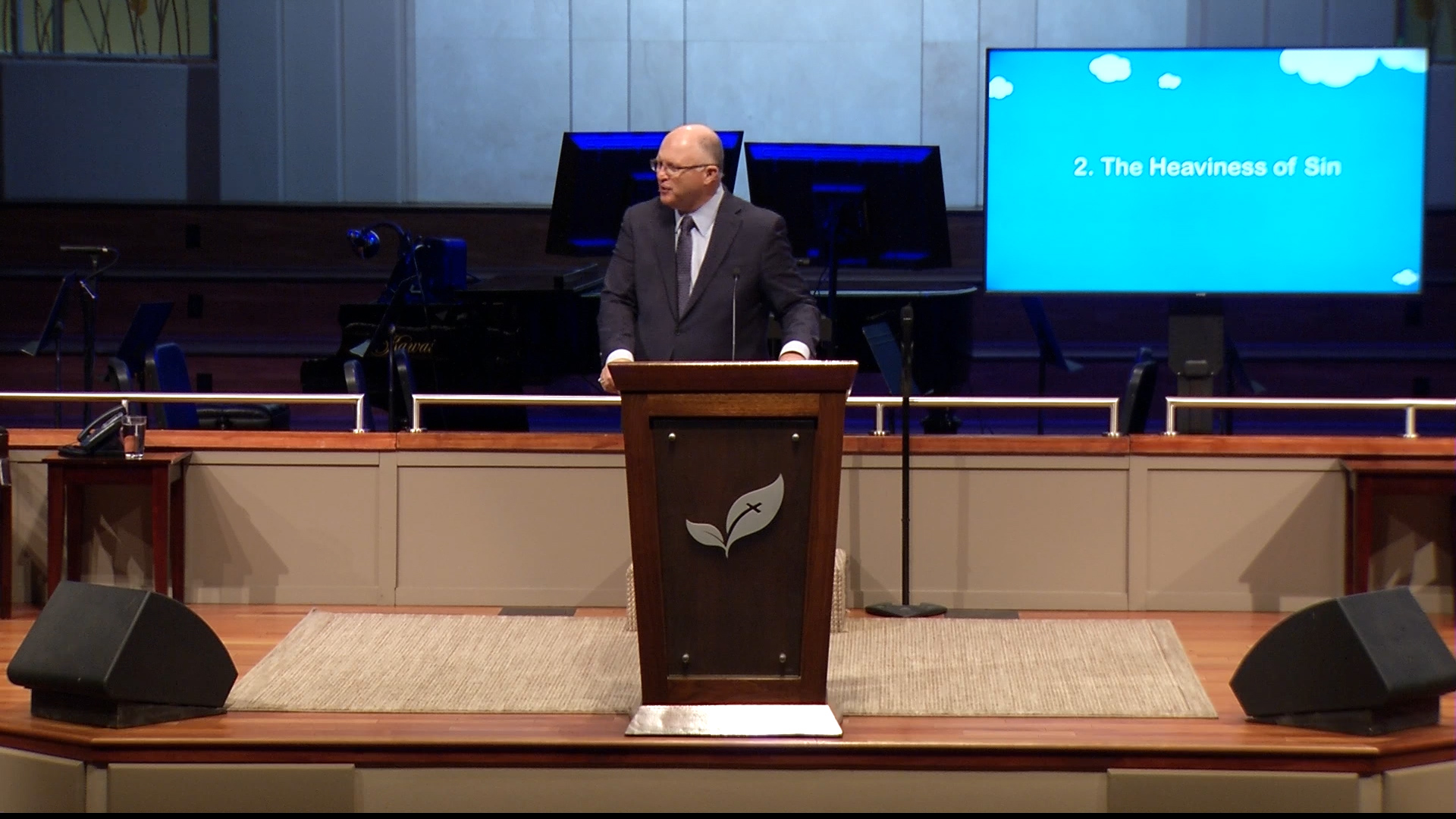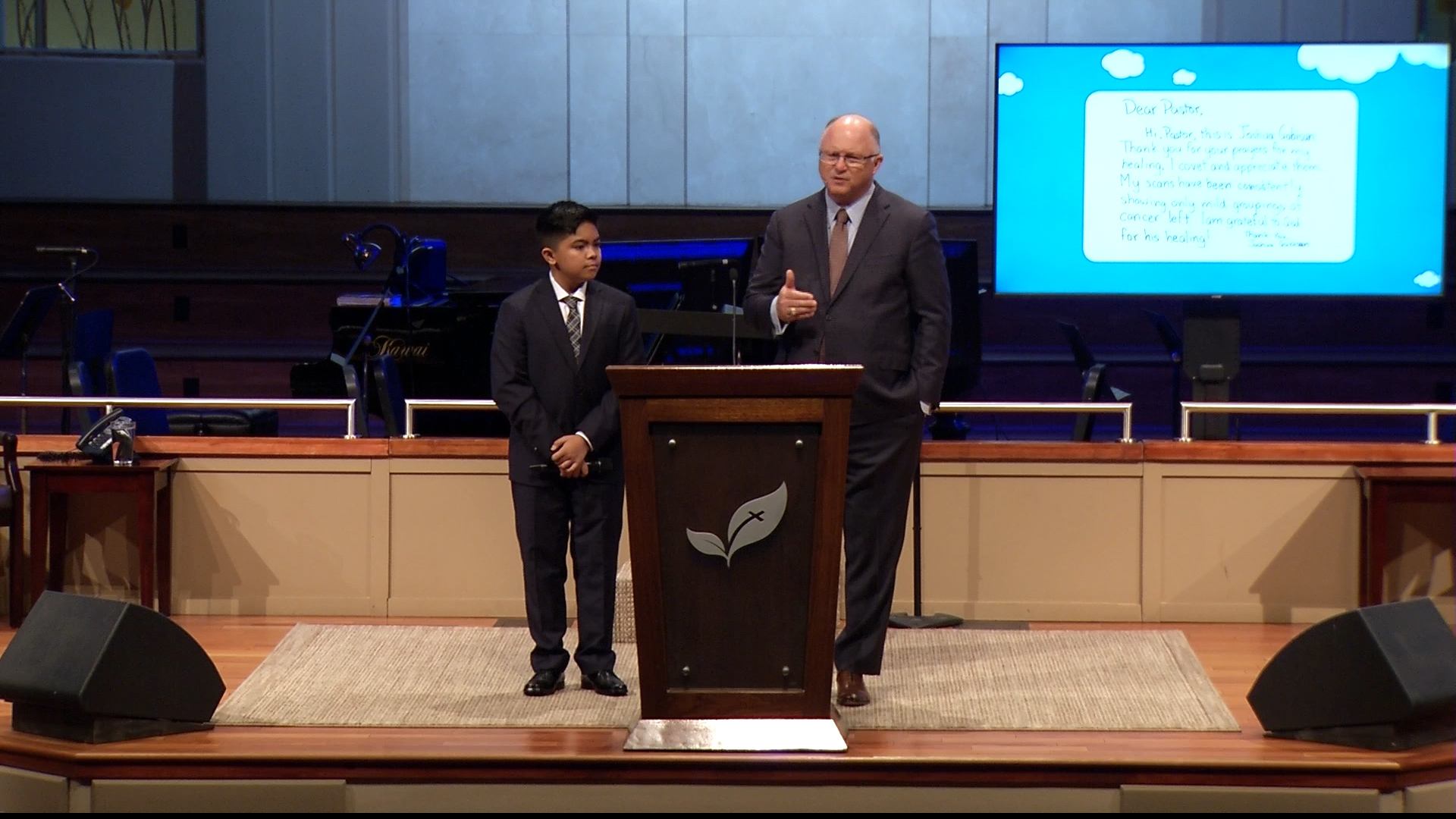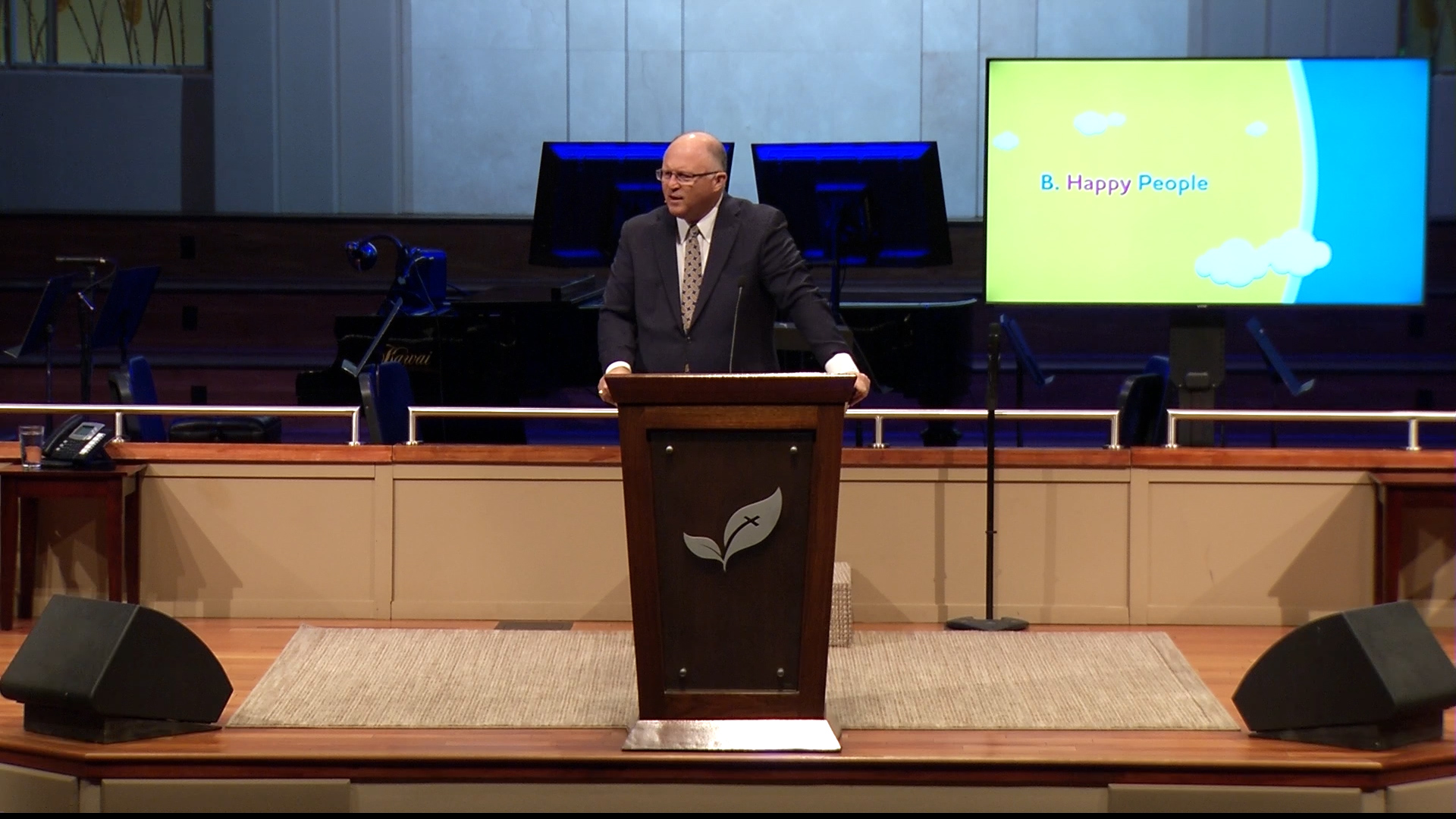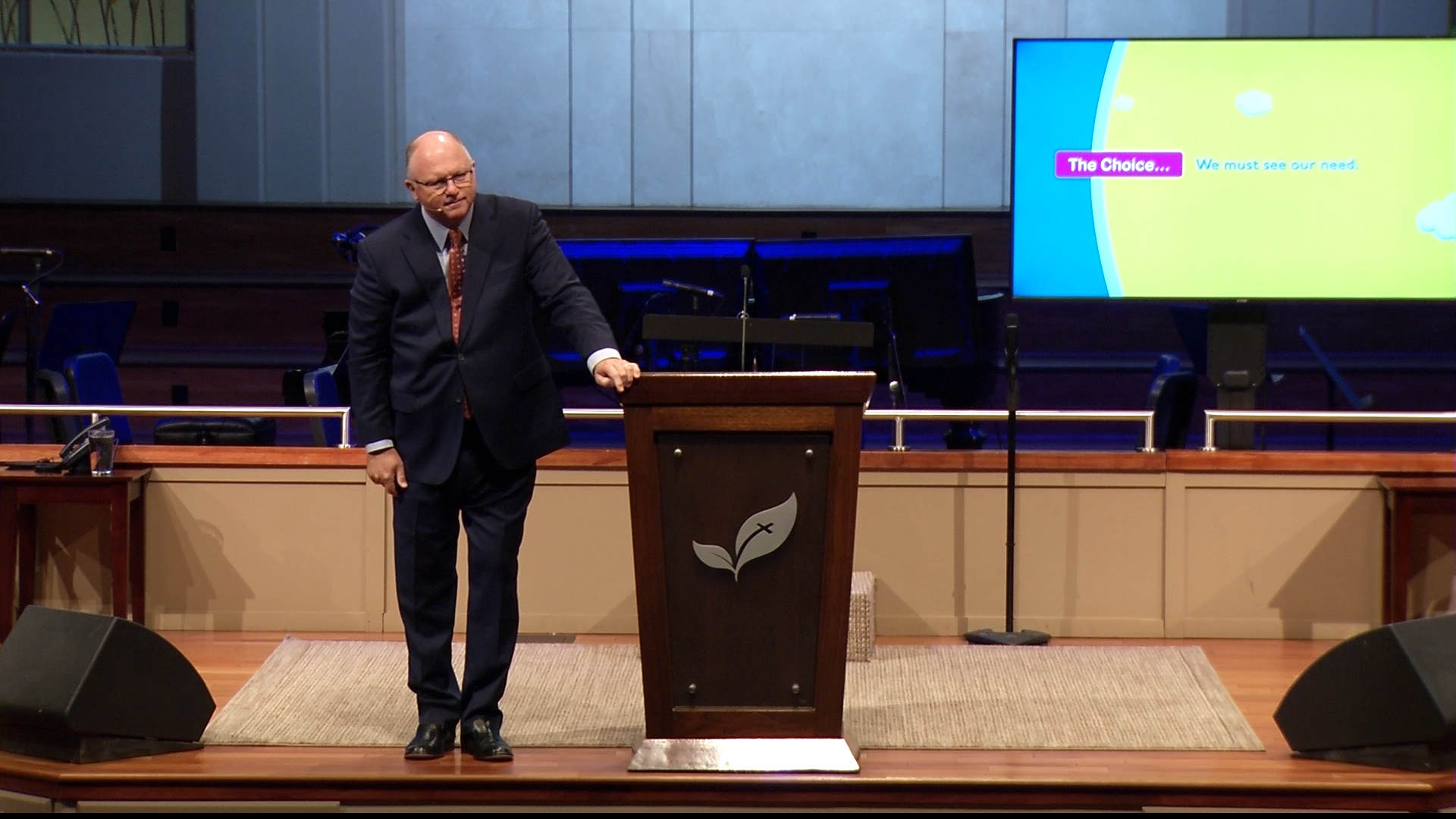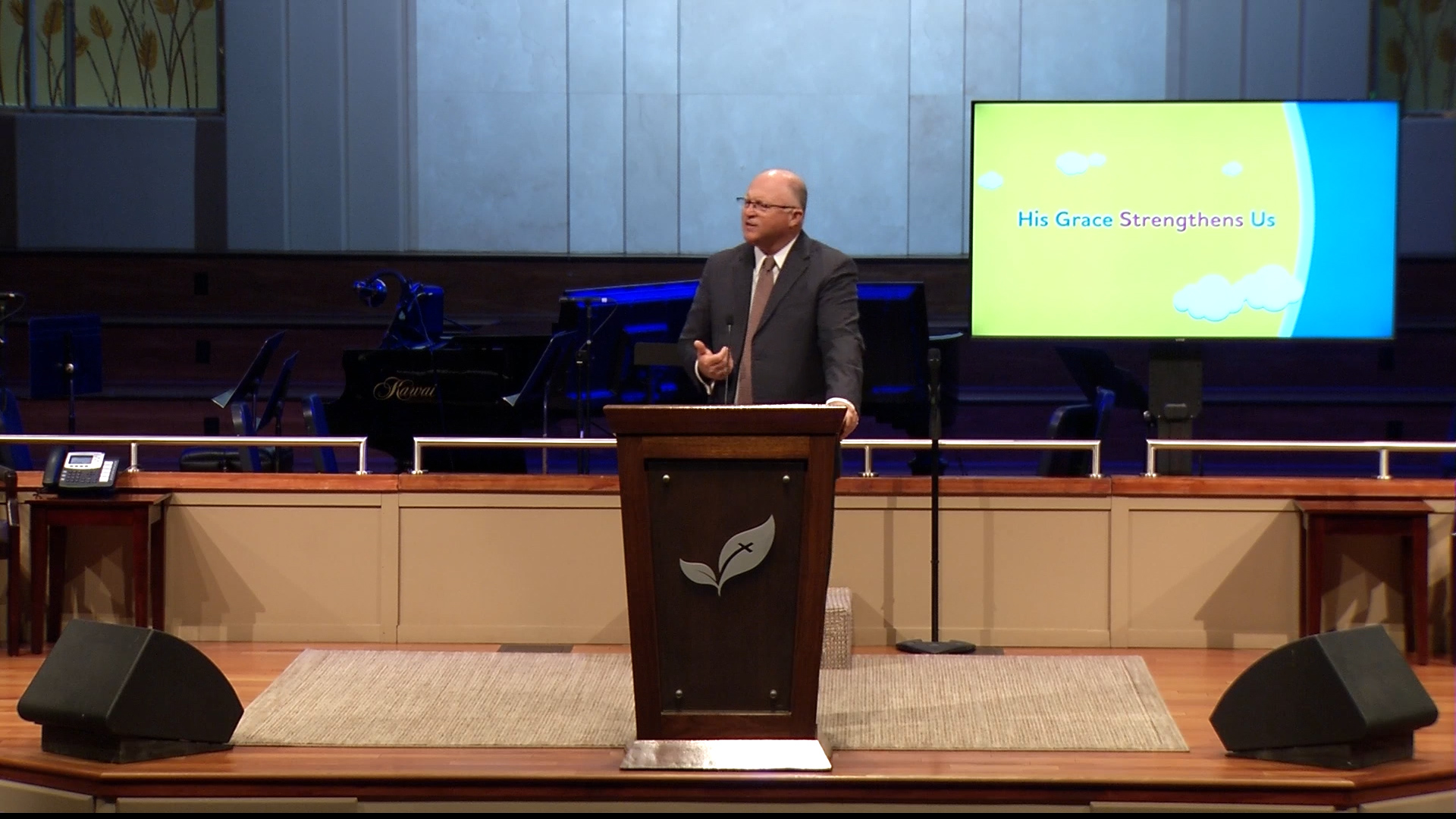Take your Bible, please, and turn to the book of Colossians this morning, Colossians chapter 3, and we're going to read two verses from this passage. Colossians 3:12-13. Let's stand one more time together. Stretch just a little bit, get your Bible open. We're going to continue our series entitled "Happiness Is." And I'm excited about this message today and this entire series. And we have some great, great messages left in the series. Next week, we're going to learn about happiness if found in serving others and what that looks like and how God blesses that. But today we're going to learn about happiness being found in forgiveness and how many times people's lives are ruined and embittered because they never find a way to forgive someone or some situation that has taken place in their life.
And so, Colossians 3, and we're going to read verses 12 and 13 this morning. "Put on therefore, as the elect of God, holy and beloved, bowels of mercies, kindness, humbleness of mind, meekness, longsuffering; forbearing one another, and forgiving one another, if any man have a quarrel against any: even as Christ forgave you, so also do ye." Happiness if forgiving others. Let's pray, and we're going to learn more about this today.
Father, thank you for the wonderful service this morning; again, a time to honor our country, our veterans; and now, Lord, a time to learn more about you and your grace. And I pray that you would bring happiness and joy into the lives of believers today. For those that, perhaps, are here and that do not know you, I pray that today they would open their heart to you. Thank you, Lord, for your word. May it find place in our hearts this morning, in Jesus' name we pray. Amen. You may be seated.
Well, there is, perhaps, no greater contrast in the New Testament when it comes to the subjects of forgiveness and unforgiveness than you'll find in the lives of the prodigal son's father and the prodigal son's elder brother. When you read in the Bible about these two men and how they responded to the prodigal son when he came back, it really amazes me the difference that we find. For example, think of the father of the prodigal son in Luke chapter 15. The Bible says that as the prodigal son comes to himself, he says in Luke 15:18, " I will arise and go to my father."
And you know the story: he came to himself, he was out of his mind in sin, and when he returns, the Bible says in Luke 15:20 concerning the father, "And he arose, and he came to his father. But when he was yet a great way off, his father saw him, and had compassion, and ran, and fell on his neck, and kissed him." The father was merry and the father was happy because he had a heart full of grace, he had a heart full of forgiveness, and he was so glad to welcome his child home.
By the way, how many of you would agree with me: that's how it ought to be, amen? When there's a repentant sinner coming home, maybe even coming back to Lancaster Baptist Church, we ought not to look down our nose at them, but we ought to be glad that they're getting things right with the Lord. That's the heart of the father of the prodigal; that's the heart of the heavenly Father also. And you know the story. He said, "Bring hither the fatted calf." He said, "Let us eat and be merry." He was trilled with what God had done.
But how many of you have ever taken a minute just to look at the elder brother's situation and to think about his response? And I've seen this response as well. The graphic this morning kind of shows us the elder brother over here. He's standing over here, he's got his arms folded. Not good body language, right? And maybe the artist has it just depicted properly there.
And the Bible says in Luke 15:28 concerning the elder brother, "And he was angry, and would not go in: therefore came his father out, and intreated him. And he answering said to his father, 'Lo, these many years do I serve thee, neither transgressed I at any time thy commandment: and yet thou never gavest me a kid, that I might make merry with my friends.'" So he's saying, "You know, I've been here doing the chores for all this time, he's been out there drinking and partying, and you're going to get the fatted calf." And he said, "You never even got a goat for me. You didn't even have a party once for me, and I stayed here the whole time faithfully."
Now if you'd be honest, there's probably been a time in your life when that spirit came over you: "You know, I've been faithful. Look at the attention that guy's getting. I do what I'm supposed to do, and he got the raise and he got the promotion, and I do what I'm supposed to do. And she got to sing the solo in the church," or, "He gets to do this in the church," and over the years those kinds of feelings can cross the hearts of many different people. And when there should have been rejoicing, there was a bitterness on the heart of the elder brother.
Now if you haven't figured it out by now, life is not always fair. Now it is when we consider the sovereignty of God. We know that God always works all things together for good. But sometimes difficult things happen and we cannot always control those circumstances. But with the Holy Spirit's help, we can control our response to the circumstances; and the elder brother was not responding spiritually at this moment.
Martin Luther once said, "Sin is pure unhappiness and forgiveness is pure happiness."
Now there may be someone in this room today who would say, "I've been through a difficult time; I can honestly say that I have forgiven the person." There may be others that want to but have not yet been able to. There may be others that tomorrow is going to be your opportunity to practice forgiveness.
But when we come to Colossians chapter 3 and verse 12, Paul is writing here – and some of you might remember this – from his imprisonment in Rome, and he is writing to the church at Colossae, which was comprised of people from many different backgrounds and many different races, and he is reminding them that the only way that they would ever have unity is that they were to put on certain spiritual clothing. And he speaks of this in verse 12. He speaks of bowels of mercies, and kindness, and humbleness of mind, and meekness, and longsuffering. And then he mentions forbearing and forgiving, even as Christ has forgiven us. And the context here of forgiveness teaches us that it is highly presumptuous to refuse to forgive someone else when you yourself have already been forgiven by Jesus Christ.
Now how many of you are thankful that your sin – past, present and future – is under the blood of Jesus Christ? How many of you are thankful for that? So then, the context here teaches us that we are to forgive, even as God for Christ's sake hath forgiven us. How presumptuous of any of us to withhold bitterness or to be the angry elder brother when we ourselves are the recipients of undeserving forgiveness by the grace of God? And so this morning I want us to look at the origins of happiness and how happiness can flow into the heart of a believer that is practicing forgiveness in their life.
Notice, if you would, first of all, that happiness is found in reconciliation with God. Happiness is reconciliation with God. Now I touched on that a moment ago, but look at verse 13. It says, "Forbearing one another, and forgiving one another, if any man have a quarrel against any: even as Christ forgave you."
Now here we see our forgiveness from God. For us to be truly able to forgive someone else, we must understand that we ourselves are forgiven by God. We must understand that we once were separated from God. The Bible is clear about that: "For all have sinned and come short of the glory of God." There was a chasm spiritually between us and God. But God, as we know, came and brought reconciliation through the Lord Jesus Christ. Look in your notes there at Romans 5:1. The Bible says, "Therefore being justified by faith, we have peace with God through our Lord Jesus Christ."
Now if you're saved this morning, you have peace with God through Jesus Christ. We are justified just as if we had never sinned because of what Jesus Christ has done. Verse 2 says, "By whom also w have access by faith into this grace wherein we stand, and rejoice in hope of the glory of God." So our forgiveness is made possible by the Lord Jesus. Romans 5:8, "But God commendeth his love toward us, in that, while we were yet sinners, Christ died for us. Much more then, being now justified by his blood, we shall be saved from wrath through him. For if, when we were enemies, we were reconciled to God by the death of his Son, much more, being reconciled, we shall be saved by his life." So at one point we were enemies, now we are called friends, and that is all because of the blood that was shed. We have been reconciled to God. He has forgiven us, he has justified us just as if we had never sinned. Our forgiveness is from God, and because of that, our rejoicing is in God.
Now we can be thrilled with the fellowship of our church family. We can be thrilled with the wonderful privilege of Christian education and activities of the church. But our rejoicing, our boasting is not in the church, it's not in the school, it is in the finished work of the Lord Jesus Christ. "Let him that glory glory in the Lord."
And notice what it says there in Romans 5:11, "And not only so, but we also joy in God through our Lord Jesus Christ, by whom we now received the atonement." Now notice that, "We joy in God." Let's say that together: "We joy in God." So our rejoicing, our joy is in God; and it's so important.
You know, one of the greatest challenges we face in counseling is just the very basic principle of unmet expectations. People come into a marriage with expectations, they come into jobs with expectations, they come into relationships with expectations; and when those expectations aren't met, then so many times there's discouragement. The problem is, we oftentimes look to men to fulfill what only God can fulfill. Only God brings joy. Only God brings internal happiness. And so we see here that our rejoicing fundamentally as Christians is in God.
Now does God give us a family? Does God give us children? Does God give us a church? Yes. But all of these blessings are sourced from God. So our rejoicing is in the Lord. And I love what Octavius Winslow said, a Baptist preacher in the 1870s. He said, "The child of God is from necessity a joyful man. His sins are forgiven, his soul is satisfied, his person is adopted, his trials are blessings, his conflicts are victories, his death is immortality, his future is a heaven inconceivable, unthought of, untold, and endless blessedness. With such a God, such a Savior, and such a hope, is he not, ought he not, to be a joyful man?"
You know, sometimes we need to just stop everything else we're doing and we need to look at the cross and we need to remember what God has done, what God is doing, and what God will do, and realize my joy doesn't come from Lockheed, my joy doesn't come from another job; my joy comes from the Lord. And this is really where happiness begins. It begins with being reconciled with God. And, friend, as the psalmist said last week: "Restore in me the joy of my salvation." Don't ever lose the wonder of it all, the wonder of having been saved.
But notice, happiness is not only found in reconciliation with God, but it is found in restoration with others. It is found in restoration with others. Now the Bible says in verse 13, "Forbearing one another, and forgiving one another." And I want to speak to you this morning about those relationships that, perhaps, feels as though you've been ripped off or didn't go the way you thought they should go. What is God's will and plan when those circumstances come?
Notice the first word here is "forbearing." It is the idea of holding back or not retaliating for what a person has done to you. And I find many times that there are people who have told me, "Well, I have forgiven him," but they're still subtly trying to hurt somebody. "I don't have a problem with it, I'm over it," but every chance they get there's a little bit of a dig.
I remember years ago there was a situation in my life, and someone had done something quite hurtful, and I remember talking to a friend of mine, R. B. Ouellette about it. I said, "Here's the situation, here's what happened," and I remember what he said. He said, "Brother Chappell, let me tell you what you need to do. You need to put that individual on the top of your prayer list and pray for him every morning." And I thought to myself, "Pray for him; I don't even want to look at his stinking name." That was my attitude. And he said, "What I have found is that if I pray for the person, it helps me to really truly bring forgiveness." And you know, it actually was sort of painful for a while, but it was good. It was what God wanted. And over time, I was able to truly release it to the Lord.
You see, there's this tendency to want to make it right ourselves or to make someone pay ourselves. But again, think of God's forbearance of us as sinners in regard to God's forbearance. He has withheld judgment from us. He had every right to bring judgment upon me. But by his grace, he saved me. By his grace, he has given heaven to me.
The Bible says in Romans 3:25, "Whom God hath set forth to be a propitiation," speaking of Jesus, "through faith in his blood, to declare his righteousness for the remission of sins that are past, through the forbearance of God." Now think about that for a moment: the forbearance of God. God could have instantly judged and not given us the chance for heaven. But he has been forbearing towards us. He has been patient with us. And so, God's forbearance of sinners is the foundation of our forbearance, again, for others.
And our forbearance of others is found in Galatians chapter 6 – and I want you to see this, how it plays into restoration. The Bible says, "Brethren, if a man be overtaken in a fault, ye which are spiritual, restore such an one in the spirit of meekness; considering thyself, lest thou also be tempted. Bear ye one another's burdens, and so fulfil the law of Christ."
Now sometimes when there's a transgression, our first instincts might be to judge or to retaliate. But God said that we should be forbearing and praying that they would come back to the Lord, praying that they could be restored in their fellowship with the Lord. You're either going to go through life as a scorekeeper or a grace-giver. You're either always keeping track of who's hurt you and how you're going to get back to them or why they're not as good of a Christian, or you're going to give grace to that one that has been unkind to you.
There was a young boy in Korea that was a houseboy for some American soldiers during the Korean War, and they would sometimes play tricks on him, and they would hide from him, they would do these little different things, and they were harmless jokes. And eventually, though, they realized the jokes were not really that funny to the houseboy, and so they apologized to him. They said, "We were just playing around, we didn't mean anything by it." And the houseboy said, "Okay then, I stop spitting in your soup now." In other words, he was getting even all along the way, right?
And you know, there are people spitting in other people's soup all over America today. Now it might not be soup, it might be their hamburger at Burger King or something like that. It might be just the way they think about them. But there are people, I believe, even in this room that whenever someone's name, whenever a circumstance comes up, it just brings grief into your heart. And the only way to overcome that is to truly forgive them, even as God for Christ's sake has forgiven you.
The Bible says, "If it is possible, to live peaceably with all men." And there have been times when even in my life it doesn't seem like it's possible; but you seek it, you long for it, you strive for it, if it's something that feels irreconcilable. And maybe the Lord will bring about it another time. At the very least in your heart you can be right towards the person. You can forgive that person as God for Christ's sake hath forgiven you. Forbearing then is mercy showing. It is not giving what someone deserves, it is forbearance as of the Lord.
And then notice the second word here is "forgiving." It says, "Forbearing one another, and forgiving one another." And this is where restoration comes into place. This is where we pardon. In fact, notice in verse 13 it says something interesting. It says, "If any man have a quarrel against another." The word here "quarrel" also could be rendered "complaint." It's an interesting word that describes if you have an occasion to complain, if you have even a legal complaint against this person, and if you have this occasion of a complaint against someone, still, the Bible says, let it go, and give it over to God. It's so important that we not harbor these things in our heart.
There was a woman that was bit by a rabid dog, and she went into the doctor. It looked like she was going to die from the rabies; it was a very serious bite. And the doctor told her, he said, "You need to put your final things in order. And so the woman immediately took out some paper, she immediately took out a pen and she began to right furiously, and she wrote and wrote and wrote on that paper. And finally, the doctor came in and he said, "That is a long last will and testament that you're writing out there." She snorted, "Will, nothing." She said, "I'm making a list of all the people I'm going to bite." Little problem with forgiveness. You meet people like that. They're good at keeping lists.
I've put in the outline of the effects of a non-forgiving heart. Notice what we see. It can bring anger and bitterness into every relationship and new experience. You know, I've met people that have had one bad relationship with a police officer, so they hate all cops. I've met women who hate men. I've met men who hate women. I mean, you have one bad experience and bitterness sets in and it begins to creep over all relationships. You can become so wrapped up in the wrong that you cannot enjoy the present. You can become depressed or anxious. You can feel that your life lacks meaning or purpose, or that your faith is failing. You can lose valuable and enriching connectedness with others. You see, when you allow bitterness into your heart, it affects so many other relationships in your life.
I heard of an elderly lady who never married, and she requested that at her funeral there be no male pallbearers. In her handwritten request she said, "They wouldn't take me out while I was living and I don't want them taking me out when I'm dead." Just a little bitterness left over there.
Now let me ask you a question. In your life and in your relationships today, are you seeking restoration or revenge? Restoration or revenge? You see, forgiveness is me giving up my right to hurt you for hurting me. Forgiveness is me giving up my right to hurt you because you hurt me. And when we come to a place where things are reconciled in our heart, then we no longer desire to see that person hurt.
I've had Christians say this. I've heard of people in trouble and I've had Christians say, "Well, they had it coming to them." You know, our first response when another Christian is hurt or sick or going through a tough time should be compassion. And yet when we have this response, "Well, they deserved it," that is indicative of something wrong in our own spirit.
Ephesians 4:32, "And be ye kind one to another, tenderhearted, forgiving one another, even as God for Christ's sake hath forgiven you." You see, to forgive is to set a prisoner free and discover that the prisoner was you. To forgive is to set a prisoner free and to discover that the prisoner was you.
Now if you've ever been hurt and you've ever held something for a while, that bothers you; understand that, yes. But the longer you hold to that and the longer you're bothered by it, the more you become the prisoner yourself. And so, happiness is found when we have reconciliation with God, but also when we have restoration with someone else or when the situation is restorative as God is giving us grace by applying his word.
Let's notice finally, happiness is the reflection of Jesus Christ in my life. Happiness is the reflection of Jesus Christ in my life. Now notice there in verse 13 it says, "If any man have a quarrel against any: even as Christ forgave you, so also do ye." So here see again that Jesus is the pattern for our lives, he is the pattern for our living, and we are to follow Christ's pattern. Even as Christ forgave, so do ye.
First Peter 2:21, "For even hereunto were ye called: because Christ also suffered for us, leaving us an example, that ye should follow in his steps." Friends, just read the gospel. He was reviled, and he reviled what? Not again, right?
When he was hanging on the cross, his hands and his feet bleeding, his brow with blood coming down. The Roman soldier piercing his side, blood and water flowing forth. When they placed the vinegar into his mouth, what were his words from the cross? "Father, forgive them; for they know not what they do." And yet the Bible says that we are to follow in his steps. How many of you are thankful today that Jesus forgives and forgets? He forgives and forgets.
Psalm 103:12, "As far as the east is from the west, so far hath he removed our transgressions." He doesn't remember, he doesn't harbor. I think about Joseph in the Old Testament, how that he had been betrayed by his brothers. He had been sold into slavery, he was taken away. And the Bible says in Genesis 50:16, "And they sent a messenger unto Joseph, saying, 'Thy father did command before he died, saying, "So shall ye say to Joseph: Forgive, I pray thee now, the trespass of thy brethren, and their sin; for they did evil unto thee." And now, we pray thee, forgive the trespasses of the servants of the God of they father.' And Joseph wept when they spake unto him."
I mean, imagine all that Joseph must have felt being sold into slavery by his brothers. Imagine being separated from his father simply because he had the coat of many colors. And he had shared his dream with his brothers, and they were bitter that God had blessed him, and they hated his coat of many colors, and they sold him into slavery; and he was separated from his father for so many years, and his father's dying request, "Joseph, forgive your brothers."
And in Genesis 50:20, he said to his brothers, "As for you, ye thought evil against me; but God meant it unto good, to bring to pass, as it is this day, to save much people alive." "You thought evil against me, but God meant it unto good." Let's say that together: "You thought evil against me, but God meant it unto good." One more time: "You thought evil against me, but God meant it unto good."
Now look, you say, "The divorce wasn't fair. The teacher's unkind. The boss is terrible." Look, they think it's evil to you, but God's going to bring something good from it. God has a purpose behind it. And if you allow bitterness to reign in your heart, you're going to miss the big picture, you're going to miss seeing what God has in mind for you. And so we must follow the pattern of Jesus who was typified in the life of Joseph; and that is a pattern of forgiveness.
And then, secondly, we must live according to the script of Jesus Christ for our lives. You know, we often quote this verse, James 1:22, "And be ye doers of the word, and not hearers only, deceiving your own selves." The word "doers" there means to imitate, to imitate, or to follow the word of God.
Jesus Christ is then our pattern, his word is our script, and we are to follow his pattern, and we are to follow his script just as an actor will go to their script and they will live out their lines on that stage. God says, "I want you to go to my Bible and I want you to live out those lines in your life tomorrow, and I want you to live out the life of Jesus Christ, and I want you to live out the pattern of Joseph who said, 'You meant it for evil, but God meant it for good,' and live the script of Jesus Christ in your everyday life."
You see, God says, "I want to give you happiness. Happiness is found in being reconciled with me through Jesus Christ." Happiness is found in being restored with others by the grace of Jesus Christ. Happiness is found when we reflect Christ in the life every day that we're living with others here and there that God's grace would be seen and very, very evident.
Some of you remember the story of Lewis Zamperini. He represented the United States by running the 5,000 meter race in the 1936 Olympics. A few years later he joined the United States Army Air Corps. He was a Second Lieutenant. He was part of the crew on the B-24 bombers in World War II. He served from 1941 to 1945. One day on a search and rescue mission in May of 1943, mechanical difficulties forced his plane to crash into the ocean. After surviving 47 days on the ocean, Zamperini drifted into the waters controlled at the Marshall Islands by the Japanese. He remained a prisoner for the next two-and-a-half years until the end of the war. If you've ever read the book or, perhaps, seen the movie, you know that he underwent beating after beating after beating during his time in the Japanese war camps.
When Zamperini returned to the US after the war, he was consumed with bitterness. He was consumed with anger; all he wanted was to see retribution on anyone and everyone that was Japanese. He especially had great bitterness in his heart for Mutsuhiro Watanabe, also known as "the Bird." This was the man that had personally pummeled him day after day after day. This was the man that had inflicted pain to him throughout the course of his imprisonment.
Zamperini was married, but still his bitterness racked his mind, and he could not sleep. All he thought about was somehow getting even with his captors and with the Bird. Soon he turned to alcohol; he didn't know how to cope with his dramatic situation as a prisoner of war. His marriage was very, very near ending when someone invited them to hear the gospel message preached at a crusade with a preacher named Billy Graham. On the second night of that crusade, Zamperini went forward and accepted Jesus Christ as his Savior. The grace of God began to work in his heart, and through time he chose to forgive his captors. Through time he was able to see the nightmares go away and his marriage begin to improve.
The next year in 1950 he went to the Sugamo Prison in Tokyo where he met many there who had been war criminals and many who had also brought great pain to war criminals. He was able to express forgiveness to them. Four days before his 81st birthday in 1998, he ran a leg in the Olympic Torch Relay for the Winter Olympics at Nagano, Japan; and while he was there, he requested one more time to meet with the Bird, Mutsuhiro Watanabe. The Bird refused to meet with Zamperini. Zamperini was willing to meet with him, Zamperini had forgiven him long ago, but the one that had inflicted so much pain was unwilling to meet with him. Can I tell you something? Without Jesus Christ, the Bird had no peace; but with Jesus Christ, Zamperini had found peace.
Now there may be others in your life that have brought infliction to you and they'll not meet with you, it may seem irreconcilable; but your life doesn't have to be ruined because of what they did to you. There is grace and forgiveness at the cross. There is peace at the cross of Jesus Christ. And God teaches us that the key to that peace is to learn to forgive, to learn to trust him.
Reconciliation with God, that's where it all beings. That allows restoration with others. And when restoration seems impossible, then simply, my friend, reflect the love of Christ; for he loves this world even when this world hates him. Even when this world see his name as nothing more than a curse word, he still died on the cross for us. And he tells us, "Follow in my steps; keep loving. Don't let bitterness come into your heart. Keep loving and keep forgiving as I did."
[End of Audio]

